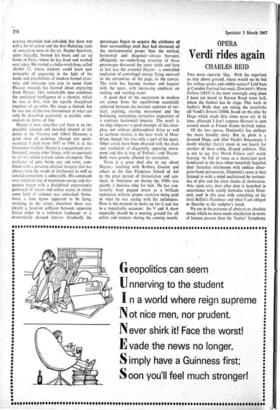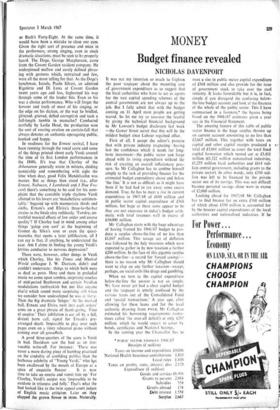Verdi rides again
OPERA CHARLES -REID
Two more operatic 'digs: With the repertory so thin above ground, where would we be but for willing spades and rubble-raisers? Laid bare at Camden Festival last week, Donizetti's Marin Faliero (1835) is the most rousingly sung piece I have yet heard in Euston Road town hall, where the festival has its stage. This week at Sadler's Wells they are taking the cerecloths off Verdi's Ernani (1844), based on the play by Hugo which made fifty times more stir in its time, although I don't suppose Hernani is seen around much at French drama festivals today.
Of the two operas, Donizetti's has perhaps the more feasible story. But its pivot is a doomed Doge, and after Verdi's Boccanegra I doubt whether there's room in our hearts for another of these noble, ill-used politicos. This is not to say that Marin Faliero isn't worth hearing. As full of tunes as a municipal park bandstand in the days when townsfolk beguiled their Saturday afternoons with endless silver- prize-band pot-pourris, Donizetti's score is best listened to with a mind uncluttered by tortuosi- ties of plot and the nicer shades of motivation. Aria upon aria, duet after duet is launched in accordance with stately formulas which Doni- zetti used in this case with something of his rival Bellini's blandness and what I am obliged to describe as his sculptor's touch.
We are in the presence of abstract or absolute music which no more needs elucidation in terms of human passion than the 'Jupiter' Symphony
or Bach's Forty-Eight. At the same time, it would have been a mistake to close our eyes.
Given the right sort of presence and mien in the performers, strong singing, even in stock dramatic situations, must be seen to be properly heard. The Doge, George Macpherson, came from the Cbvent Garden resident company. He underpinned mellow and surely defined phras- ing with gestures which, restrained and few, were all the more telling for that. As the Doge's henchman, Israele, Paolo Silveri, an admired Rigoletto and Di Luna at Covent Garden twent years ago and less, foghorned his way through some of the louder bits. Even so his was a choice performance. Who will forget the fervour and truth of most of his singing, or the edge on his diction, or the way he bridled, glittered, grieved, defied corruption and took a full-length tumble in manacles? Conducted zestfully by Leslie Head, the production won the sort of roaring ovation on curtain-fall that always denotes an authentic operagoing public, hooked and happy.
In readiness for the Ernani revival, I have been running through the vocal score and some of the things printed about early Verdi around the time of its first London performances in the 1840s. It's true that Chorley of the Athenaeum generally wrote in mittens, chiding nannyishly and remembering with sighs the time when dear, good Felix Mendelssohn was master. But as things then stood (i.e., after Ernani, Nabucco, I Lombardi and I Due Fos- cart) there's something to be said for his com- plaint that the cantabile triple rhythms Verdi allotted to his lovers are `makebelieve sentimen- tality.' Sugared up with manneristic thirds and sixths, Ernani's and Elvira's three-to-the-bar strains in the finale cloy ruthlessly. 'Tawdry, un- truthful musical effects of low order and coarse quality'? If Chorley had in mind among other things `galop con cori' at the beginning of Gomez da Silva's rout or even the quasi- mazurka that opens a later jollification, all I can say is that, if anything, he understated the case. Am I alone in finding the young Verdi's levities conducive to nervous depression?
There were, however, other things in Verdi which Chorley, like his Times and Musical World colleague J. W. Davison, didn't and couldn't understate: things to which both were as deaf as posts. Here and there in preludial music we come upon sombre, surprising touches of mid-period Beethoven and certain Verdian modulations (unfreakish but not like anyone else's) which sound more surprising still when we consider how undeveloped he was at thir:y. Then the big dramatic 'hinges.' At the masked ball, Ernani and Elvira rush into each others' arms on a great phrase of thanksgiving, 'Fino al sospiro.' Their jubilation is cut off by a fell, distant horn call, signal for Ernani's pre- arranged death. Impossible to play over such pages even on a tinny rehearsal piano without coming over all gooseflesh.
A good three-quarters of the score is Verdi in bud. Davidson saw the bud as an irre- vocable write-off. For instance: 'There was never a more daring piece of humbug practised on the credulity of confiding publics than the hothouse celebrity of "Young Verdi," who his been swallowed by the mouth of Europe as a
spice of exquisite flavour . It is now time to take an emetic and vomit him up.' For Chorley, Verdi's output was 'impossible to be outdone in triteness and folly.' That's what the bud looked like to the twin appeal court judges of English music criticism. Later on they clapped the grown flower in irons. Naturally.



































 Previous page
Previous page